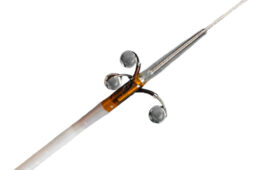
Liz Sydnor [Photo courtesy of Eurofins Medical Device Testing]
With extensive industry experience, specifically in sterility assurance of medical devices and manufacturing, Ms. Sydnor is experienced in standard microbiological test methods, microbiological investigations, protocol validations, test method validations, and data analysis.
She spent several years working with leaders in the healthcare testing and manufacturing industries and served in the United States Army as a Petroleum Laboratory Specialist.
Ms. Sydnor holds a B.S. degree in biology from Cleveland State University, and is currently pursuing her MBA at Temple University, Fox School of Business.
What first drew you to medtech? When did you first know you wanted to be in the industry?
Sydnor: I joined the Army almost 20 years ago as a petroleum laboratory specialist. I fell in love with the lab and later stumbled on microbiology during my time in undergrad. My first industry opportunity was with a microbiology lab that tested medical devices. I was immediately intrigued at the vast array of medical devices and clear correlation we had with ensuring patient safety.
What projects, past or present, have made you love what you do?
Sydnor: Each time I’ve been a part of a root cause analysis project it became the catalyst in my development and growth as a scientist. I was able to share some of my findings at an international conference because of something that was initially deemed a failure. It has shaped how I look at opportunity; failing is an opportunity to learn.
What projects are you most looking forward to?
Sydnor: What excites me nowadays is process optimization. I started my career in the lab environment, which had a strong focus on finding solutions and transitioned into supporting medical device manufacturing, which prioritized efficiencies and now my current role is lab director. This has provided me with a unique perspective to combine the two to ensure we find creative ways to provide quality results in an efficient manner.
Describe your biggest leadership challenge. How did you conquer it or resolve it, or what was the outcome?
Sydnor: In the beginning I noticed a pattern of not feeling welcomed or accepted in my leadership roles. What I learned is I’m here for a reason, I have a unique set of experiences that make me who I am and that allows me to bring value to my role. Sharing my experiences with my colleagues really helps build lasting relationships.
What are some of the barriers women face in today’s medtech industry, if any?
Sydnor: Representation. Being in an industry dominated by men can be intimidating. Often times it feels like women have to prove they’re adequate for the position. From my experience, I had to walk in confidence even when I didn’t feel seen, heard, or welcomed. Looking back the industry has made significant strides to be more inclusive.
In your opinion, what more can be done to promote greater participation of young women in the medtech industry today?
Sydnor: I think it’s extremely important for companies and universities to make a dedicated effort in engaging young women leaders at the grade school level. This gives them an opportunity early on to see what women in this industry do. I’ve met so many young ladies in my career who have said to me “I’ve never met a scientist before.” I’d like to normalize young women considering S.T.E.M. careers.
Why is it important for companies to be more inclusive and have more women in charge?
Sydnor: Representation matters. There is something encouraging about seeing leaders who look like you. I specifically remember two women leaders early on in my career and I remember thinking to myself “I want to lead an organization like them someday.” Additionally, corporate diversity, equality and inclusion initiatives help cultivate an environment where people feel more comfortable being themselves. From a business perspective, there is data supporting the idea that companies with a diverse workforce are more profitable.




